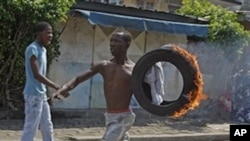Ivory Coast's presidential candidates took competing oaths of office Saturday, deepening the country's political crisis and raising the prospect of further violence.
Last Sunday's presidential vote was meant to reunite the country after a brief civil war. But Ivory Coast is now more sharply divided with dueling presidencies and competing electoral results that threaten to drag the country deeper into crisis.
By annulling as fraudulent nearly 10 percent of all ballots cast, Ivory Coast's constitutional council says President Laurent Gbagbo won election with more than 51 percent of the vote. He was sworn in Saturday before a lively crowd at Abidjan's presidency.
But the country's electoral commission says former prime minister Alassane Ouattara won the election with more than 54 percent of the vote. He took his own oath of office Saturday, saying the last few days have been difficult, but the country is now in good hands.
Ivory Coast's military backs President Gbagbo. Former rebels who still control most northern regions say Mr. Ouattara is the winner.
The African Union is warning against undermining the electoral process and the will of the people, saying that could lead to a " crisis of incalculable consequences " .
France, the United States, and the European Union have joined the United Nations in calling on Mr. Gbagbo to step aside for Mr. Ouattara.
That outside pressure only seems to embolden the president, who used his inaugural address to denounce what he calls terrible cases of foreign interference that threaten Ivory Coast's sovereignty. Mr. Gbagbo said political crises in Africa are caused by people who do not respect the law. That is essential, he says. No country can be strong without respecting laws and procedures.
He says the electoral commission has never had the authority to determine the credibility of a vote. That power has always been the sole responsibility of the constitutional council, and Mr. Gbagbo says people who do not understand that do not understand the law.
A 2007 peace deal signed by Mr. Gbagbo says the United Nations must certify the results of this election. Because the U.N. certified the original electoral commission results that show Mr. Gbagbo losing, Mr. Ouattara says he is the rightful president.
In a letter to the constitutional council, Mr. Ouattara said the exceptional circumstances Ivory Coast is undergoing at the moment do not permit him to swear the oath in person, so he is sending a written oath in his capacity as president.
Soldiers set up roadblocks in Abidjan Saturday. The country is already under an overnight curfew. All the borders are closed. Foreign news broadcasts are suspended indefinitely.
Rival Presidential Candidates Take Dueling Oaths of Office in Ivory Coast




